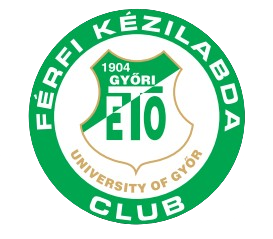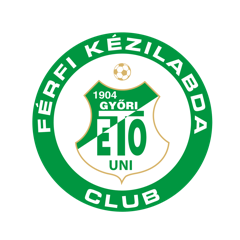- Győr's most popular and most successful team was formed in 1904 by members of the Magyar Vagon- és Gépgyár, under the name Egyetértés. The name soon changed to ETO, i.e. Egyetértés Gymnastics Section.
- In the spring of 1949, Győr Vasas ETO was already in the NB II, finishing last in the six-team field.
- The following year, as a result of reorganization, NB II was abolished. In the regional championship, the team coached by Lajos Dudás fought against the teams of Pécs, Tatabánya, Ajkacsinger völgye, Nagykanizsa and Kaposvár.
- In 1950, the ETO came third, and in 1951 it was able to enjoy a gold medal.
- The team coached by Pál Lengyel only played on small pitches from 1955: from the following year, István Kránitz took over the professional management and started building a new team.
- In 1958, the feat was achieved: ETO reached NB I for the first time.
- The boys achieved an unexpected success the following year: they came in third by collecting the same number of points as the champion Spartacus and the silver medalist Ú. Dózsa.
- During these years, handball enjoyed immense popularity in Győr: on May 1, 1960, five thousand people cheered on the Textiles court for the clash between the two city rivals, ETO and Textiles, which ETO won 17:5.
- In 1961, the team made progress: after the previous year's bronze, the silver medal went to Győr!
- In 1962, the ETO finished in fifth place as a member of the closely contested leading field. The following year (1963) brought another podium place, the team finished third.
- In 1964, much to the chagrin of the fans, ETO finished last, in 14th place, and was relegated from the first division.
- The exile lasted only one year: in 1965, under the leadership of coach Zoltán Duck, the team immediately returned to the top, winning the NB II Western group with a huge six-point lead.
- At the end of the 1966 season, ETO finished in 5th place in the table, as the leading team in the tight midfield. It was a controversial year: while the team lost only 4 points at home, they managed to score only 5 away. The biggest success of the season was undoubtedly defeating the later champion Honvéd (15:14). In this championship, József Horváth, Lajos Horváth, Gyula Böröczki, Jenő Szüts, Zsolt Molnár and László Boglári made their debut in the NB I.
- 1967 was a gray year, as the team only finished 8th. 1968 was an even worse year: ETO finished the championship in 12th place, just 1 point ahead of already relegated Dózsa Pécsi. The bad performance was mainly due to the poor autumn season, when the green and whites collected only 5 points in 13 games. In this season, the later successful coach, Tibor Szaló, made his debut as a player in the ETO.
- 1969 was an important year in the life of the team in many ways. The team started the season with a new coach, Attila Joósz, under a new name, Rába Vasas ETO. The team copied the previous season, once again staying in the league by 1 point. ETO scored only 3 points away from home. The names of Károly Visi and László Pelikán should be mentioned, who did a lot to avoid relegation with their 130 and 121 goals respectively. Imre Balogh, a later member of the golden team of the 80s, wore the ETO jersey for the first time.
- 1970 was a calmer year, the team finished in 10th place, well away from the relegation zone. This year, ETO made its mark in the Hungarian People's Republic Cup, the predecessor of today's Hungarian Cup. The boys reached the finals with a one-goal victory against Ércbányász Pécs, where they lost 16:13 to Spartacus. József Horváth, László Pelikán, Imre Balogh, Károly Visi, Lajos Cséka, Ákos Ajtony, Tibor Szaló, Zsolt Molnár, József Pálmai, Józsa Kálmán, Vilmos Jámbor and Viktor Dudás fought for the silver medal.
- During the spring rounds of the 1971 season, ETO excelled on the podium: they defeated Honvéd and Spartacus, who later won the podium, and even defeated the future champion (ETO-Elektromos 18:10). However, the bravura victories were often followed by incomprehensible failures, so the green and whites finally took 6th place.
- In 1972, the team came 6th again in the championship, and reached 4th place in the MNK. At the five-hoop games in Munich, as a member of the national team, the first ETO handball Olympian, the 157-time national team goalkeeper, József Horváth, represented the green and white colors.
- Attila Joósz led the team to the top in 1973: in addition to the second place in the championship, Rába ETO won the first gold medal in the discipline and won the Hungarian People's Republic Cup. The team composed of József Horváth, Gyula Böröczki, Károly Visi, Imre Balogh, Lajos Cséka, László Samodai, József Pálmai, Lajos Horváth, György Szórádi, László Pelikán, András Kristofori, György Gyömörei made history.
- In 1974, Attila Joósz was replaced by Ákos Ajtony on the bench. The team finished 6th in the league, three points short of the podium.
- In 1975, Zoltán Vestztergom and the later national team goalkeeper, László Hoffmann, made their debut in the ETO. Repeating the previous year's performance, the team finished in 6th place, the reason being primarily the poor performance away from home.
- In 1976, the field of the first division was reduced from the previous 14 to 12. Another important change was that from this season the matches were played on an indoor pitch. The team began its years-long downward spiral, finishing in 9th place, just one point ahead of the already relegated Székesfehérvár MÁV. Another young, later decisive player made his debut in the ETO in the person of Tibor Oross, László Samodai scored 118 goals.
- 1977 brought an even more miserable performance, the team did not score any points away from home, so it was a minor miracle that thanks to its better goal difference, ETO finally stayed in NB I. Samodai stood out for himself again, his 160 hits need no comment. László Tóth and Zoltán Kádár took to the track among the adults.
- In 1978, ETO took 10th place again, although this time 4 points ahead of the relegators. As a guest, the boys performed poorly again, they managed to score points only in Pécs, and the team lost its last six games. The team's most successful player was László Pelikán, with 121 goals. The young Ottó Csicsay played his first matches in a green and white jersey.
- In the 1979 season, as usual, at one point staying inside was the past. With three rounds before the end, in the elimination round, the guard beat his main opponent, Dunakeszi, by a ratio of 26:17, thus ensuring his membership in the first division.
- The 1980 season started well, as ETO defeated the previous year's champion Tatabánya at home, but in the end everything remained the same: the green and whites finished in 10th place, i.e. just barely in the bottom.
- 1981 was still under the threat of relegation. They managed to win away from home once, in Dunaújváros. At the end of the championship, Kohász was just behind ETO in the standings, one point behind. The greens stayed in, the reds were out.
- ETO started the 1982 season under the guidance of old-new coach Attila Joósz. The successful coach returned after eight years, and a calm year finally followed under his leadership, the team finished in 8th place, far ahead of the relegations.
- From 1983, there were clear signs of improvement, ETO finished fourth in the championship. During the season, László Pelikán, who signed a contract with the then East German Socialist Republic, said goodbye to Győr.
- 1984 has many similarities to the previous year. ETO again missed the podium by two points and finished fourth, József Vura again became the home scorer, this time with 196 hits. However, the team's game got better and better, and the Győr fans were preparing for a really big throw.
- The fans did not have to wait long, as in 1985 the team won a bronze medal. At home, ETO lost only one point, whose key players were Zoltán Kádár (150 goals), József Vura (132) and Mihály Iváncsik (114). After the end of the championship, the MNK matches took place at the end of the year. To get to the top four, ETO beat Dunaújváros with a double win, just as it beat Tatabánya back and forth. Next came the final against Honvéd, which brought incredible excitement. On December 20, the red and white military team triumphed in the capital at 20:18. Two days later, the rematch was arranged in Győr, where ETO, led by Kádár with 11 goals, won 20:18. Since there was absolute equality between the teams, the seven-meter matches followed, which ETO won by a ratio of 5:4. The team consisting of Imre Balogh, Béla Cseh, Ottó Csicsay, István Deáki, Attila Domonkos, Zsolt Horváth, Mihály Iváncsik, Zoltán Kádár, Tibor Oross, László Polgár, László Tóth, Zoltán Vestztergom, József Vura won the second MNK trophy in the club's history.
- 1986 will be remembered for winning the IHF Cup. Two rounds already took place in the autumn of the previous year, but the turkish Simtel and the swiss Basel did not put the Iváncsiks to a serious test. Earlier in the spring, the Slovakian Eperjes team was dismissed by the ETO with a 2-goal difference overall, after the 11-goal victory against Proleter Zrenjanin in Győr in the first match of the semi-final, the rematch was just a formality. In the final, the opponent was the Spanish Technisan Alicante, the 6-goal advantage gained at home was preserved in the second leg (23:17, 20:24), so the ETO (Imre Balogh, Béla Cseh, Ottó Csicsay, István Deáki, Attila Domonkos, Zsolt Horváth, Mihály Iváncsik, Zoltán Kádár, Tamás Menyhért, Tibor Oross, László Polgár, László Tóth, Zoltán Vestztergom) became the second team in the history of Hungarian men's handball to win the European Cup. To this day, this is the only international triumph achieved at a major tournament in the club's history. In the fall of 1986, ETO already made its debut in the KEK, where, after confidently knocking out Israel's Hapoel Ramat Gan, in the quarter-finals MTSV Schwabing from Germany beat Kádár with an away goal.
- In the fall of 1986, ETO already made its debut in the KEK, where, after confidently knocking out Israel's Hapoel Ramat Gan, in the quarter-finals MTSV Schwabing from Germany beat Kádár with an away goal.
- In 1987, the dream came true, ETO became the champion. The team confidently finished in first place with a 6-point advantage. Zoltán Kádár scored 167 goals, Mihály Iváncsik 126. With three rounds to go, the team won the gold medal in Győr by defeating the big rival VÁÉV-Bramac by 28:20. The first gold medal was awarded to the team formed by Imre Balogh, Péter Cseri, Ottó Csicsay, István Deáki, Attila Domonkos, Kálmán Fenyő, Zsolt Horváth, Mihály Iváncsik, Zoltán Kádár, Tamás Menyhért, Tibor Oross, László Polgár, Attila Szekér, László Tóth, and Zoltán Vestztergom. is attributed to him.
- The MNK matches took place at the end of summer and beginning of autumn in 1987. Győr prepared for the triple. ETO beat Elektromos twice, so they had a match with Honvéd among the four. After the 12-goal victory in Győr (33:21), there was not much excitement left for the rematch in Budapest (21:26). VÁÉV-Bramac was again the opponent in the final. In Veszprém, the home team won by one goal, but ETO made no mistakes at home (19:20, 21:14). The students of Tibor Szaló won the cup for the third time in a row.
- In November 1987, ETO played against the Spanish Atletico Madrid in order to reach the top 8 teams of the KEK. After the confident victory in Győr, everyone was sure of advancing, however, in the rematch, the team with the injured Iváncsik and Csicsay suffered an unexpected defeat and was forced to say goodbye to further matches (24:15, 13:24).
- The year 2003 was not successful, the team was relegated and they played again in the county championship for 4 years.
- However, the team was again promoted to NB II in 2006. In the 2010-2011 season, they successfully overcame the obstacles and won the NB II championship..
- The following year, the team finished in 2nd place in the NB I/B championship.
- The 2012-2013 championship year followed, where they achieved overwhelming success and won the season. This gave them the right to participate in NB I.. Ezzel jogot formáltak az NB I-ben való részvételre.
- The summer of 2013 brought the biggest change in the life of the team, as they acquired the right to use the name ETO, so they started the 2013-2014 season under the name ETO – SZESE Győr in September, which did not bring much success , the people from Győr could only enjoy 10 victories.
- The following season, the 2014-15 season, started again in the NB I/B, which has since become a dominant team with a chance to win the podium.
- In the 2017-18 season, the team showed a confident and balanced game, which was enough for second place on the podium.
- Currently, the team plays in the NB I/B and their goal is to return to the NB I again.
Győr ETO-UNI FKC Kft. was founded in 2023. It will officially start its operations in the 2023/24 league season. Our supplies are provided by the Győr Men's Handball Public Foundation and the Sports Association of Széchenyi University, SZESE.
Its task is to raise men's handball in Győr to a higher level (NB/I), in parallel with István Széchényi University, by applying the "Learn and Play in Győr" principle. Our first team is currently playing in the NB I/B division. Several of our junior teams play handball in the first division for their age group.
After winning the 2023/24 season, our first team from the NB I/B class was again promoted to the NB I, where from September 2024, it will try to achieve the best possible result along with new goals and challenges. Several of our junior teams play handball in the first division for their age group.
The center of the sports organization is the Magvassy Mihály City Sports Hall.
The sports development program of Győr ETO-UNI FKC Kft. follows the guidelines that correspond to the long-term strategy of handball.
Our goal is for men's handball in Győr to enter a new, high-quality era, to adopt the "startup philosophy", to introduce innovative solutions, and to apply dynamic solutions in order to increase our competitiveness. At the center of our vision is the increase in efficiency. Arousing interest in work, creating a positive motivation and attitude system is a priority.
Győr ETO-UNI FKC Kft. considers it necessary and essential, both professionally and in terms of resources, to establish, develop and maintain a supply-educational base that represents a suitable alternative and starting point for young people.
Our Hungarian champions:
- 1987: Imre Balogh, Péter Cseri, Ottó Csicsay, István Deáki, Attila Domonkos, Kálmán Fenyő, Zsolt Horváth, Mihály Iváncsik, Zoltán Kádár, Tamás Menyhért, Tibor Oross, László Polgár, Attila Szekér, László Tóth, Zoltán Vestztergom. Coach: Tibor Szaló
- 1988-1989: Imre Balogh, Péter Cseri, Ottó Csicsay, István Deáki, Attila Domonkos, Kálmán Fenyő, Gábor Felföldi, Zsolt Horváth, Mihály Iváncsik, Zoltán Kádár, Tamás Menyhért, Tibor Oross, László Polgár, Ferenc Rádli, László Tóth, Vestztergom Zoltán. Coach: Tibor Szaló
Our Hungarian Cup (MNK) winners:
- 1973: Imre Balogh, Gyula Böröczki, Lajos Cséka, György Gyömörei, József Horváth, Lajos Horváth, András Kristofori, József Pálmai, László Pelikán, László Samodai, György Szórádi, Károly Visi. Coach: Attila Joósz
- 1985: Imre Balogh, Béla Cseh, Ottó Csicsay, István Deáki, Attila Domonkos, Zsolt Horváth, Mihály Iváncsik, Zoltán Kádár, Tibor Oross, László Polgár, László Tóth, Zoltán Vestztergom, József Vura. Coach: Attila Joósz
- 1986: Imre Balogh, Ottó Csicsay, István Deáki, Attila Domonkos, Zsolt Horváth, Mihály Iváncsik, Zoltán Kádár, Tamás Menyhért, Tibor Oross, László Polgár, László Tóth, Zoltán Vestztergom. Coach: Tibor Szaló
- 1987: Imre Balogh, Ottó Csicsay, Péter Cseri, István Deáki, Attila Domonkos, Kálmán Fenyő, Zsolt Horváth, Mihály Iváncsik, Zoltán Kádár, Tamás Menyhért, Tibor Oross, László Polgár, Attila Szekér, László Tóth, Zoltán Vestztergom. Coach: Tibor Szaló
Our international cup winners:
- 1986, IHF Cup
- Imre Balogh, Béla Cseh, Ottó Csicsay, István Deáki, Attila Domonkos, Zsolt Horváth, Mihály Iváncsik, Zoltán Kádár, Tamás Menyhért, Tibor Oross, László Polgár, László Tóth, Zoltán Vestztergom. Coach: Tibor Szaló
- Our Olympic placers:
- 1972, Munich: 8th place József Horváth
- 1988, Seoul: 4th place Ottó Csicsay Mihály Iváncsik Tibor Oross
- 1992, Barcelona: 7th place Ottó Csicsay Mihály Ivancsik
Our world championship places:
- 1986, Switzerland: silver medal Mihály Iváncsik Tibor Oross
- 1990, Czechoslovakia: 6th place Mihály Ivancsik






